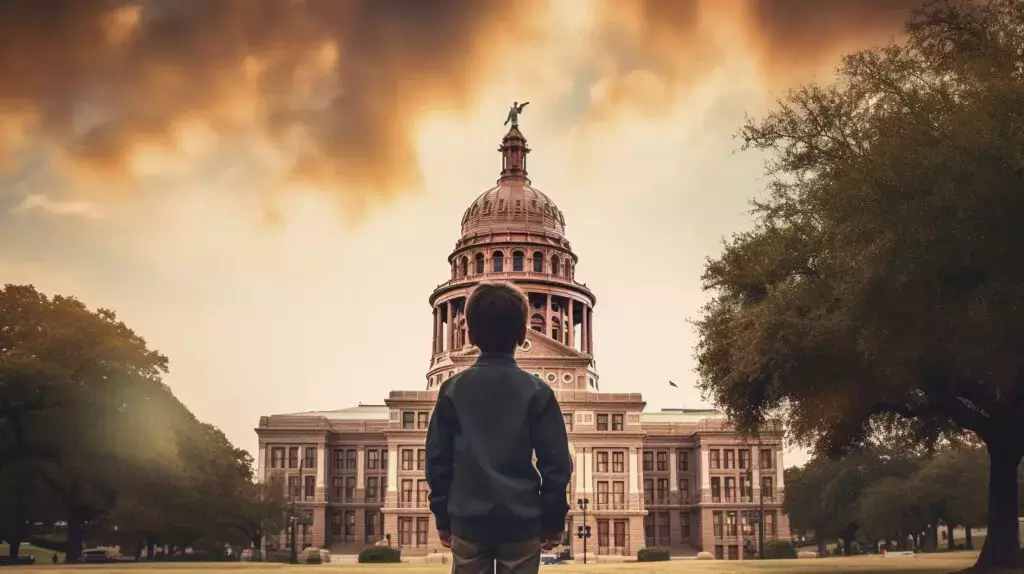|
Originally published at Texans for Fiscal Responsibility.
Texas Gov. Greg Abbott (R) is again promoting what could be universal school choice during the third special session in Texas that starts on Oct. 9th. That would be among the best actions Texas can make, the other being eliminating property taxes. School choice expert Corey DeAngelis recently noted, “Education funding is meant for educating children, not for protecting a particular institution. It’s time for Texas to fund students, not systems.” In the Texas Legislature’s regular session this year, several school choice bills were proposed, but all died. State Sen. Brandon Creighton (R-Conroe) had the best case for education savings accounts (ESA) in Senate Bill 8, and it passed the Senate with an 18-13 vote. But it died in the House Public Education Committee, where other school choice bills have died in previous sessions. Creighton’s proposal sought to establish an ESA program, the gold standard for school choice already adopted by ten states. ESAs provide parents with funds for each child, which can be used for various approved education-related and approved expenses. These expenses include traditional public schools, private school tuition, homeschooling materials, tutoring services, and more. They aren’t the derogatory word of “vouchers” thrown around by anti-school choice folks. Vouchers move funds from a government school to another school. ESAs, on the other hand, provide funds to parents for them to use for their kids, which is why they have been determined to work well within our constitutional system and provide accountability by parents on how they use the funds. This market-based, limited-government approach provides a productive path to achieving the goal of improving student outcomes at the least cost to taxpayers. But naysayers in the education system and supposed religious freedom advocacy groups are raising the alarm against school choice. Clay Robinson, spokesperson of the Texas Parent Teacher Association, recently asserted, “The more money you have to spend on private schools, the less you have to spend on public schools,” echoing a widely-held concern among rural voters. These arguments, however, are based on misleading premises. In reality, government schools wouldn’t have less spending on it unless parents chose to send their kids elsewhere because those schools didn’t meet their kids’ unique needs. This should be a concern for government school proponents, but this isn’t something that they want to address. Instead, proponents just want more funding for a flawed monopoly system. More funding should be rejected, as there is more being spent on government schools in Texas than ever before with dire outcomes. And rural school districts and their advocates who have long been the barrier to getting school choice passed have nothing to worry about. If there aren’t any other options for students, then they will continue to attend government schools. But I wonder if they know that, when there is competition in the marketplace, other options pop up meeting the demand; which would be a great outcome for families and teachers. ESAs can address a pressing issue of quality teachers. Texas teacher salaries are reported to lag behind the national average, which doesn’t account for the lower cost of living in Texas compared with many other states. However, this could contribute to a teacher shortage statewide, along with other concerns by teachers of the problems at government schools, including a large increase in funding to administrators rather than teachers. Only about 20% of every dollar going to the classroom goes to the teacher, so government schools should correct this failure before receiving any additional funding. The current government-run monopoly schooling system isn’t helping educators even as the system has received at least 16% in inflation-adjusted spending per student since 2002. Teachers in many states where government schools hold a monopoly have little to no negotiating power as they are stuck in the state’s pay schedule based on tenure and other limited factors. Moreover, lower-income families often find themselves trapped within government-run schools determined by district lines. And all of this is at a huge cost to taxpayers, threatening people of losing their homes from exorbitant property taxes, and declining student outcomes. ESAs, while not a silver bullet, substantially expand educational options, directing tax dollars to parents to do what’s best for their kids rather than to a bureaucratic, failing schooling system. States that have embraced universal school choice with ESAs are fostering competitive education markets, driving innovation, and achieving notable improvements in educational outcomes. Parents gain the power to choose the best educational options for their children, while teachers benefit from more professional opportunities and negotiating power. So, is the current government school system truly the best option for Texas? The answer will become apparent if we implement universal school choice for all children. Otherwise, the Lone Star State risks falling behind other states prioritizing educational freedom and student achievement. America’s system of free-market federalism, when allowed to function, reveals what works and what fails, resulting in a more prosperous society over time. Education deserves the same opportunities for experimentation and innovation. School choice has the potential to break the government-run schooling monopoly that stifles innovation and keeps costs high with declining outcomes. Equal funding to parents, who are taxpayers, for their kids, can reveal which schooling options truly earn parental support, thereby incentivizing educators and administrators to innovate and provide our children with the education they deserve. As the third special legislative session starts, the Texas Legislature must prioritize responsible stewardship of taxpayer funds and embrace the transformative potential of universal school choice. It’s time for Texas to lead the way, empowering parents, nurturing educational freedom, and ensuring our children have the brightest possible future. Anything less would be a disappointment, and worse, a tragedy for the future of the bright young minds of tomorrow.
0 Comments
Your comment will be posted after it is approved.
Leave a Reply. |
Vance Ginn, Ph.D.
|


 RSS Feed
RSS Feed